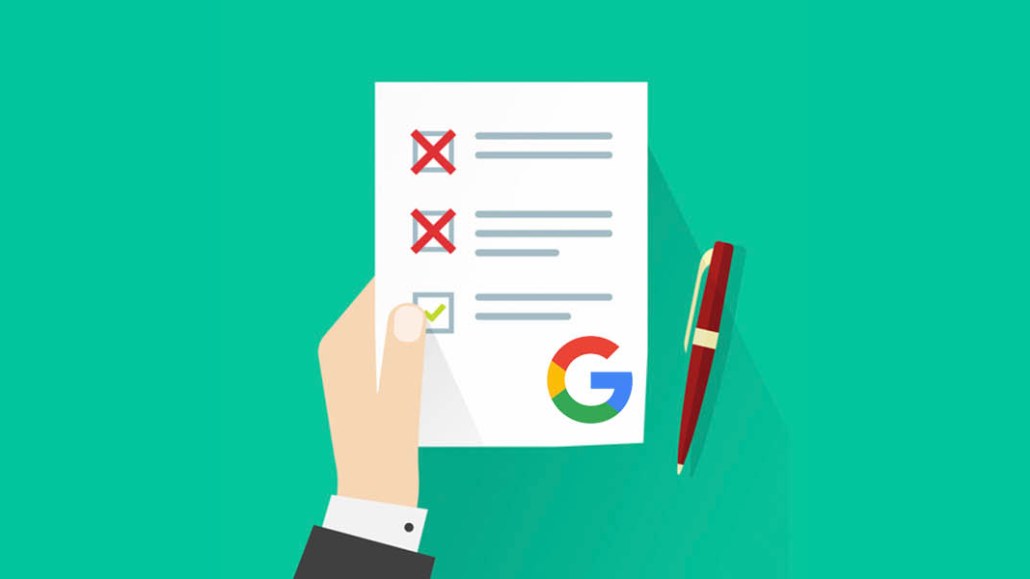Last chance to save on Digiday Publishing Summit passes is February 9

Google will tell publishers how it plans to integrate with the independent industry standard for compliance with the General Data Protection Regulation at meetings on May 24 at four of its global offices, including London and New York, according to publisher sources.
Details are still to be worked out on exactly how Google will address some of the more tricky technical integrations that will arise from aligning its own ad tools with the Interactive Advertising Bureau Europe’s and IAB Tech Lab’s Transparency & Consent framework. But Google will put a time stamp on its full integration with the framework at the meetings — to be no later than July, according to people familiar with the matter. It will also commit to being an official listed vendor within the framework later this week.
“We absolutely want to be a part of the IAB framework,” Scott Spencer, Google’s director of product management, said to AdExchanger. “We plan to register.”
Richard Reeves, managing director of the Association of Online Publishers, said in a statement: “The ongoing dialogue between Google, AOP, and its members continues and the confirmation that Google plans to integrate with the IAB Framework demonstrates a significant step forward. We’ll always seek to work collaboratively with industry partners, and this is a great example of how our concerns have been listened to and responded to in a constructive and positive manner.”
Google confirmed the meeting will take place, but not the details of the meeting.
In theory, Google’s move to make its own ad tools compatible with the IAB framework is a victory for publishers, despite the fact that the framework itself hasn’t been an immediate hit with publishers. Many regarded it as a tool to serve the business purposes of ad tech vendors, at their own expense.
The IAB Europe has been working to rectify those concerns and provide more granular controls for publishers. But Google’s noticeable absence from the list of 166 vendors that have already signed up to the IAB framework — the only attempt at an industry standard for complying with GDPR, has unnerved publishers.
Even now, publishers aren’t convinced their questions will be fully answered during the May 24 meeting. In fact, many of the biggest publishers have not decided yet whether they want to attend the meeting. Instead, they would prefer Google to respond publicly to the open letter that media trade bodies Digital Content Next, European Publishers Council, News Media Alliance and News Media Association sent to Google’s CEO Sundar Pichai. Together, the bodies represent 4,000 publishers and have said they will not attend. Each trade body head has declined to attend the meeting. Google has since invited more publishers individually.
“We want them to answer publicly, so we’d reject any invite to attend Thursday’s meeting in any event,” said a U.K. publishing executive who agreed to speak anonymously.
The concern is that if all publishers agree to a closed-door meeting, they will receive vague verbal assurances and walk away with nothing in writing, according to publishing sources. Among the more cynical viewpoints: Google has arranged the meeting as a public relations exercise, but with no real intention of change.
The fact that two days prior to the meeting, many major publishers have not yet decided whether or not to attend speaks to the level of distrust between Google and publishers, exacerbated by GDPR. The law itself, so open to interpretation, has caused much confusion and last-minute scrambling across the industry.
Google’s GDPR stance, which it updated just weeks before the deadline for enforcement, has been regarded as an unwelcome distraction and pressure by publishers, who are still being inundated with data protection addenda from agencies and vendors with only days to go before the law takes effect.
“The meeting is likely a PR exercise by Google to demonstrate how they’re shepherding the industry,” said Jason Kint, CEO of publisher trade body Digital Content Next. “Why else hold a private, closed-door meeting on the last day before GDPR enforcement begins. There have been more than enough private discussions. Considering Google’s privileged position, it’s high time Google answer the questions of the industry rather than only serving its shareholders.”
Download our newly updated guide to GDPR, including recent developments, research, checklists and much more to know before May 25.
More in Media

Brands invest in creators for reach as celebs fill the Big Game spots
The Super Bowl is no longer just about day-of posts or prime-time commercials, but the expanding creator ecosystem surrounding it.

WTF is the IAB’s AI Accountability for Publishers Act (and what happens next)?
The IAB introduced a draft bill to make AI companies pay for scraping publishers’ content. Here’s how it’ll differ from copyright law, and what comes next.

Media Briefing: A solid Q4 gives publishers breathing room as they build revenue beyond search
Q4 gave publishers a win — but as ad dollars return, AI-driven discovery shifts mean growth in 2026 will hinge on relevance, not reach.







